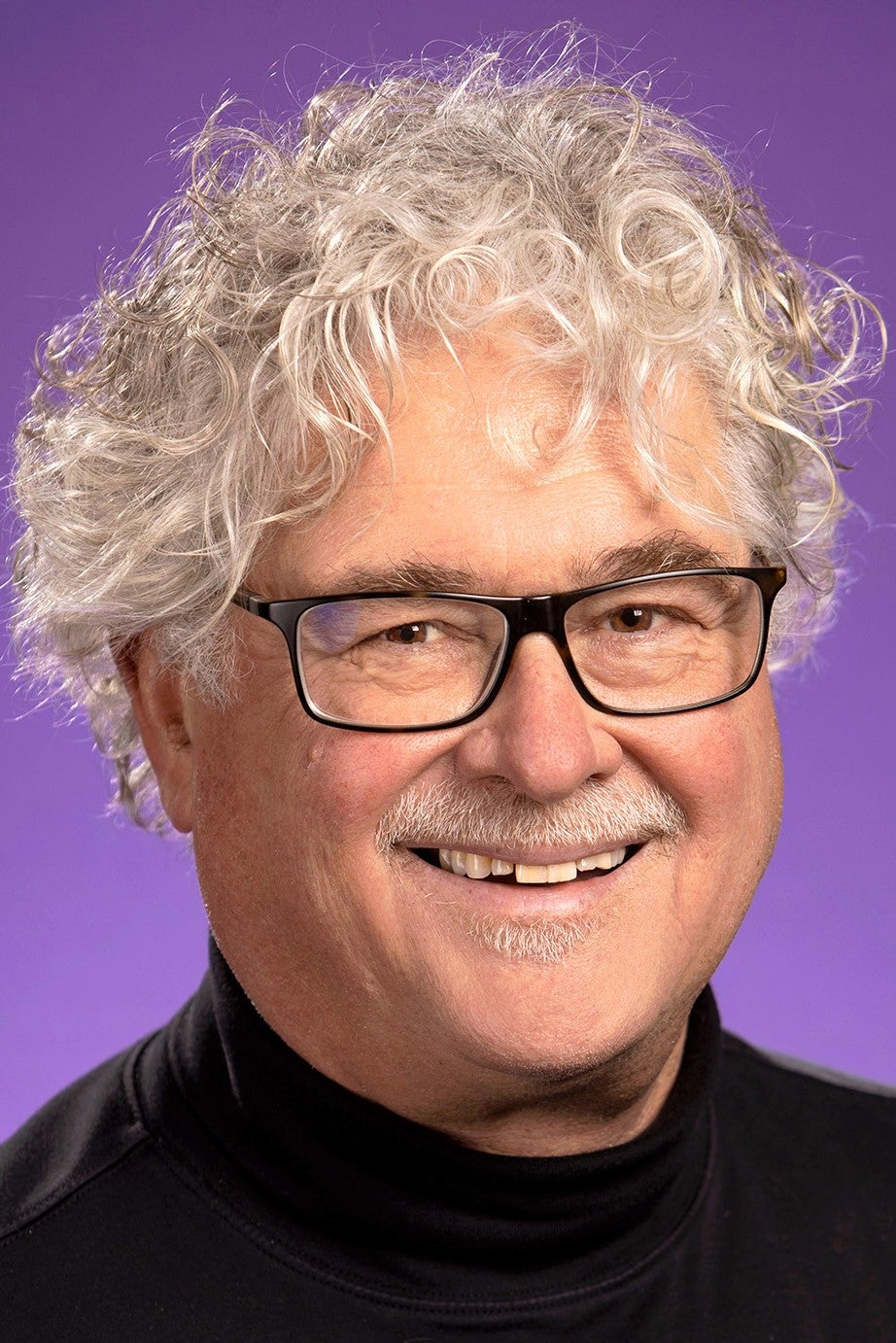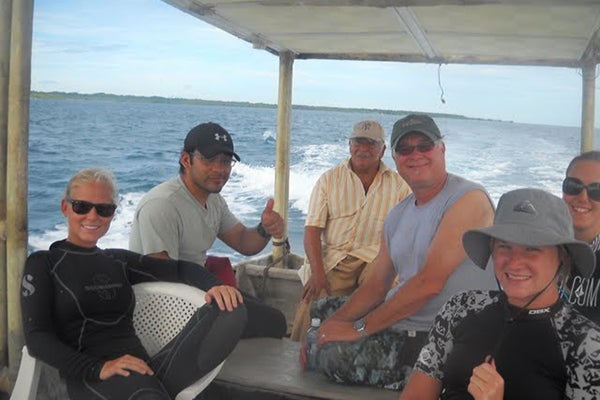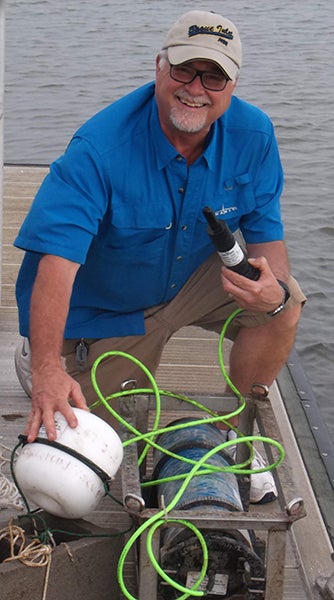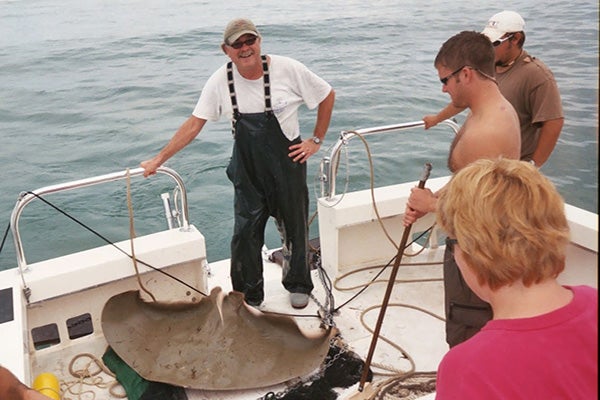ECU’s Harriot College names Dr. Joseph Luczkovich to distinguished professorship
East Carolina University’s Thomas Harriot College of Arts and Sciences has named Dr. Joseph Luczkovich, professor in the Department of Biology, to the prestigious rank of distinguished professor. Luczkovich is the college’s 25th distinguished professor. The announcement was made at the 61st annual college convocation on Aug. 16.
“I am honored to have been selected for the Harriot College distinguished professor award by Dean Danell and the selection committee,” Luczkovich said.

Dr. Joseph Luczkovich, professor in the Department of Biology, was named as Harriot College’s 25th distinguished professor at the annual convocation on Aug. 16. (Photo by Rhett Butler)
The appointment to distinguished professor is the highest honor within Harriot College and is conferred upon a professor whose career exemplifies a commitment to and a love for knowledge and academic life as demonstrated by outstanding teaching and advising, research and creative productivity, and professional service.
“I have read about Thomas Harriot, who was a British scholar. He was an astronomer, mathematician, ethnographer and navigator. He studied the physics of the refraction of light through lenses, before it was described by Snellius, and he learned the language of the Algonquian people living on Roanoke Island. He was truly an interdisciplinary scholar,” Luczkovich said. “So, this award means a great deal to me, as I am in the company of the many great scholars (including Thomas Harriot) we have at ECU. I will do my best to continue to achieve excellence in teaching and research for ECU and the college.”
Dr. Allison S. Danell, dean of Harriot College, said she and committee members were inspired and impressed by Luczkovich’s long and storied career as a valued faculty member in the Department of Biology.
“Joe’s nomination package offered a compelling view of the positive influence he has had on the educational experiences of many students — in classes and high-impact field experiences — the excellent mentorship he has offered student researchers and his high-quality, interdisciplinary research that has brought in significant extramural support and media attention,” she said. “Finally, Joe is a model colleague who energetically serves the unit’s needs, and beyond, to meet ECU’s teaching, research and service missions.”
“This was the first time I have been nominated, and I am gratified to be among the previous awardees,” Luczkovich said. “I know there are many deserving faculty in the college, and I am glad to have them as colleagues.”
Luczkovich joined ECU’s faculty in 1990 as a visiting professor, and over the past 30 years, he has displayed the qualities and characteristics required of a distinguished professor, Danell said.
Teaching and Advising
“Initially, I thought I would only stay a year or two as a research scientist with a coastal focus, but ECU made me feel welcome. I have found a home here,” Luczkovich said. “I have had many great colleagues and students in the 34 years since arriving, with whom I have published scholarly works and conducted interdisciplinary research. Teaching our diverse student population at ECU is highly rewarding, and I love sharing what I have learned over my career with them.”
In a letter of support for his nomination, one of Luczkovich’s former students wrote, “To this day, my research program is centered around the scientific questions and methods that Joe exposed me to during my master’s program. He had a profound impact on my life and career as a scientist.”

Luczkovich, third from right, led ECU’s 2010 summer study abroad marine field ecology class in Panama. These students are going snorkeling.
Luczkovich has taught numerous undergraduate courses, including environmental biology, interdisciplinary coastal and marine studies, and marine biology. He has taught graduate courses in marine community ecology, estuarine ecology and a survey of coastal and marine resources. He led a study abroad course in marine ecology in Panama and pioneered a course in data analysis for coastal resource management for students enrolled in the coastal doctoral program.
“Students find his courses challenging and regard him as a knowledgeable instructor who seeks to provide them with opportunities to excel and gain valuable experiences in the field,” another one of Luczkovich’s nominators wrote. “He strongly advocates for getting students outside to learn about nature firsthand and has trained many students who have pursued careers in fisheries biology.”
Beyond teaching, Luczkovich is an effective mentor. He has led 12 students to complete a master’s degree and four to complete a doctoral degree. Currently, he is mentoring two doctoral students and three master’s students.
“Dr. Luczkovich was an exemplary mentor, educator and researcher whose dedication to teaching and subject expertise significantly shaped my career,” a former student wrote.
Research and Creative Activity
Research and creative activity are important to Luczkovich, which is reflected in the grant funding he has secured, publications authored and works cited.

Luczkovich deploys a hydrophone – an underwater device used to detect and record ocean sounds from all directions – at the University of South Carolina’s Baruch Marine Field Laboratory. (Contributed photos)
He is a marine ecologist specializing in the ecology of coastal fishes and fisheries, network models of food webs of estuaries — specifically the flow of energy and nutrients through ecological food webs — and sound production by fishes.
“Greenville is a true picture-perfect college town, combining the best of two worlds: a small university campus with an important mission to educate the citizens of North Carolina; and a major research university near the coast,” Luczkovich said. “I like being near the coast which has allowed me to conduct marine ecology and coastal biology research in all of North Carolina’s estuaries and the Atlantic Ocean.”
One of Luczkovich’s nominees wrote, “The work that Dr. Luczkovich completes is incredibly important to help us better understand ecological systems and how human activity could negatively impact the populations of commercially and recreationally valuable fish.”
Along with Dr. Mark Sprague, associate professor in the Department of Physics, Luczkovich developed early remote acoustic sensing techniques (fish acoustic buoys) for North Carolina sounds, and more recently used an unmanned ocean robot (a wave glider known as Blackbeard) on the continental shelf to determine positions and relevant environmental conditions of tagged southern flounder. Another use of Blackbeard is to map the acoustic signatures of ocean habitats, a relatively new aspect of ocean research.
“I never considered leaving ECU after that first year, mainly because of the wonderful collegial atmosphere in the Department of Biology, the Institute for Coastal and Marine Resources, the Institute for Coastal Science and Policy, the Coastal Studies Institute and Harriot College,” Luczkovich said. “These departments and institutes have provided me with the resources required to study the fishes and estuarine organisms of the North Carolina coast, with a diversity of life and ecosystems only a short drive or boat ride away.”
Luczkovich has supported his research with nearly $1.7 million in grant funding from multiple sources, including the National Science Foundation, National Marine Fisheries Service, the NC Department of Environmental Quality and the NC Sea Grant. He has authored three books, three book chapters, 38 peer-reviewed journal articles and 46 proceedings papers, and he has participated in more than a dozen scholarly presentations and invited talks. His work has been cited more than 3,500 times, with 13 articles cited more than 100 times each.
Due to his highly influential work, Luczkovich’s research gains attention from popular media outlets. He has been interviewed by NPR’s “Talk of the Nation” and “All Things Considered,” and the New York Times for his work on fish acoustics. His work on fish acoustics was featured on Comedy Central’s “Colbert Report,” given the widespread popular perception that fish do not “speak” to each other to initiate sexual relations.
Professional Service
Throughout his career at ECU, Luczkovich has provided many hours of service to the academic community and beyond, including several societies important within the field of ecology.

Luczkovich and an ECU ichthyology class, in the Department of Biology, found and identified a smooth butterfly ray off Shackleford Banks, NC.
“Joe’s work is very well known and highly regarded among colleagues in the U.S. and abroad who are interested in the breadth of fish biology and particularly bioacoustics,” a nominator wrote in a letter of support. “Joe is viewed as a meticulous investigator who has a great breadth of knowledge and expertise, and his findings and his views are taken very seriously and with great respect.”
Luczkovich served on the governing boards of the Coastal and Estuarine Research Federation and for the Atlantic Estuarine Research Society. He was president-elect and then president of the Atlantic Estuarine Research Society between 2017 and 2020, and he was president of the Tidewater Chapter of the American Fisheries Society.
At ECU, Luczkovich has served on the biology department’s personnel committee (including as chair), executive committee and graduate committee. In addition, he has supported ECU’s efforts in coastal research, including serving on the research vessels users committee, diving and water safety control board, faculty search committees and the coastal maritime council.
“Dr. Joe Luczkovich’s outstanding achievements as a scholar and educator epitomize the qualities of a distinguished professor. His unwavering dedication to excellence, interdisciplinary collaboration and societal impact make him an exemplary candidate for this prestigious award,” a nominator concluded.